Find Out What To Eat Before Running For Max Energy
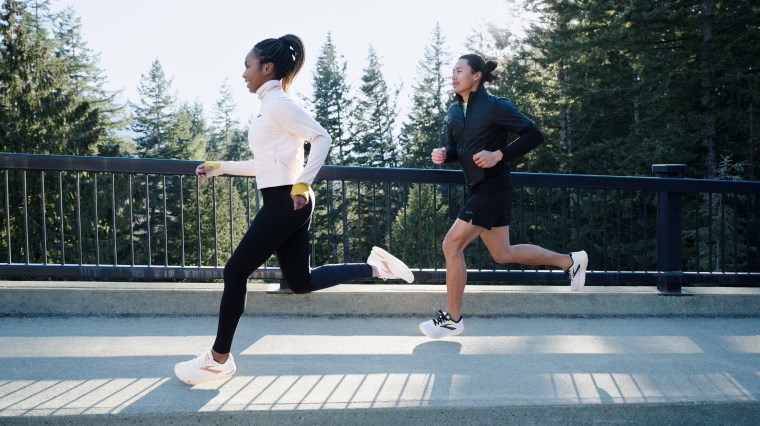
The secret to unlocking your full running potential may not be just under your feet but also on your plate and in your water bottle.
Proper nutrition is an absolute must for athletes, and runners are no exception. It’s the fuel that powers your engine – just as you wouldn’t expect your car to run without fuel, you wouldn’t expect your body to be at optimum performance levels without proper nutrition.
Let’s break down the importance of proper nutrition when training as a runner.
How Proper Nutrition Aids Physical Training
Proper nutrition is crucial for running for several reasons, including optimising performance, aiding recovery and preventing injuries. The right nutrients can help you maintain your energy levels, improve your performance and prevent fatigue, which is why it can take years for some athletes to put together their ultimate diet.
That being said, there are a few general tips on what to eat before running that apply universally to anyone looking to train as a runner.
To start, aim for a meal that’s high in carbs, moderate in protein and low in fat and fibre. Although high fibre meals are essential to support healthy overall nutrition, they increase the demands of your digestive system and can cause GI distress if consumed too close to your run, so it's important to test your tolerance.
It’s suggested that you eat about three to four hours before you put on your women's running shoes or men's running shoes. This will allow for adequate nutrient absorption and avoid indigestion or discomfort while running.
As a rule of thumb for what to eat before running, you should include carbohydrates, protein and healthy fats to help you perform at your best. Carbs are your go-to for quick energy, fats are ideal for long-distance running and protein aids in muscle recovery. Before you hit the road in your compression tights and Hoka shoes or Brooks shoes, remember to bring fluids to stay hydrated while you’re training.
Whether you’re a beginner or a seasoned pro, even with the best ASICS shoes on your feet, without the right nutrition, you could be running on empty. Approach your meals with the same enthusiasm you bring to your runs; choose the foods that suit your type of training best, and consume the appropriate amounts as your training load requires.
The Powerhouse Impact Of Carbohydrates
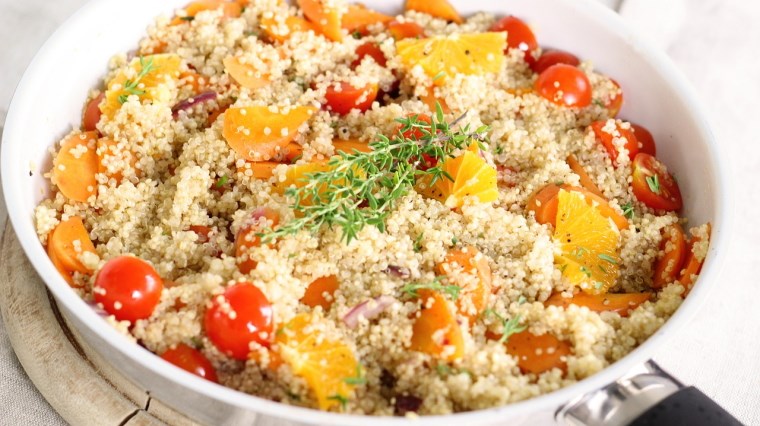
Carbohydrates are the primary source of energy that keeps you going when training, whether you’re sprinting or in for the long haul of a marathon.
When you consume carbs, they break down into glucose, which is then stored in your muscles and liver as glycogen. During physical activity, your body breaks down glycogen, which fuels muscle movement. If you’re planning to go for a run, carbs are your best friend for quick and efficient energy.
Here are some of the top carbohydrate sources for runners:
- Wholegrains. Think brown rice, quinoa (above), oats and whole-wheat pasta. These are not only rich in carbs but also provide essential nutrients that help build muscle.
- Fruits. Bananas, oranges and berries are excellent for a quick energy boost and are easy to pack for a snack break between laps.
- Starchy vegetables. Sweet potatoes and pumpkins are great options for a carb-rich, nutrient-dense meal or snack.
💡KEY TAKEAWAY: Carbohydrates are the primary energy source that fuels your runs. Choosing the right carb sources and timing your carb intake can make a significant difference in your performance and endurance.
Why Proteins Are Crucial For Muscle Health
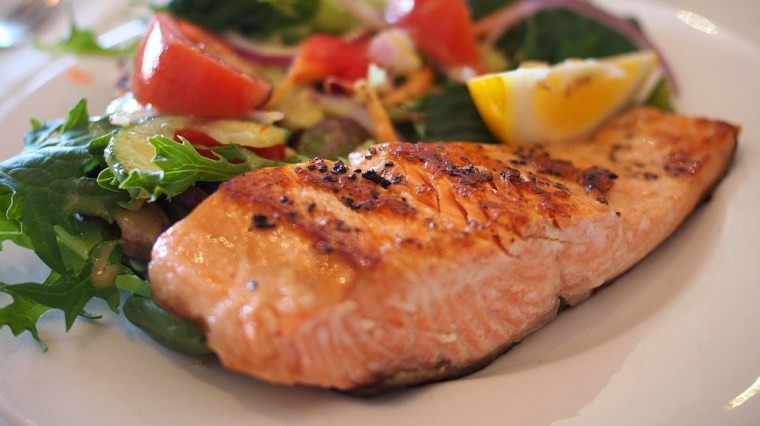
Proteins are the building blocks of your muscles, and they play a pivotal role in your running performance and recovery.
This is because proteins are essential for muscle repair and growth. When you run, your muscle fibres experience microscopic tears. Protein helps repair these tears, allowing your muscles to grow stronger. This is also why you often hear about athletes gulping down a protein shake after a strenuous workout.
That being said, while protein is vital for muscle repair, carbs are your primary energy source. It’s important to balance your protein diet with carbohydrates for your post-run meal. This ensures you’re refuelling your glycogen reserves while also aiding muscle repair.
Here are some of the top protein sources for runners:
- Lean meat. Chicken, turkey and lean cuts of beef are excellent for muscle repair.
- Fish. Salmon and tuna are not only rich in protein but also provide omega-3 fatty acids.
- Plant-based fibres. Lentils, chickpeas and quinoa are fantastic options for vegetarians or those looking to diversify their protein sources.
- Dairy. Greek yoghurt and certain cheeses are high in protein and make great post-run snacks.
💡KEY TAKEAWAY: Protein plays a huge role in muscle repair and growth, and balancing it with carbs can significantly impact your running performance and recovery.
Dietary Fats For Endurance Running
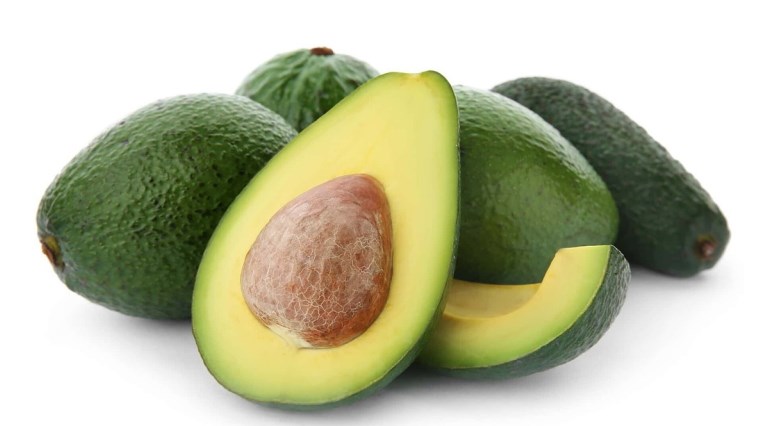
Fats often get a bad rap, but they’re actually a crucial component for sustained energy, especially for endurance running.
Contrary to popular belief, dietary fats are not always the enemy. In endurance runs, for example, they serve as a slow-burning fuel source that kicks in once your quick-burning carbs are depleted. Your body taps into stored fat for energy once your glycogen reserves have run low.
If you’re planning a marathon or a long training session, certain fats in your diet will not only help you keep going but also keep you healthy.
The key is moderation. Consuming fatty foods right before a run can lead to digestive issues and a feeling of sluggishness. Make sure to leave ample time before going on a run after a meal.
Here are some healthy fats you can include in your diet:
- Avocado. This fruit is surprisingly rich in monounsaturated fats and is incredibly versatile.
- Nuts and seeds. Almonds, walnuts and chia seeds are handy for a quick snack, with the added bonus of being packed with nutrients.
- Fish. Salmon and mackerel in particular offer omega-3 fatty acids, which are great for heart health.
- Olive oil. A quick drizzle on your salad can go a long way towards providing the fats you need.
💡KEY TAKEAWAY: Fats are essential for sustained energy in endurance running and can make a significant difference in your performance and stamina.
The Importance Of Hydration & Electrolytes
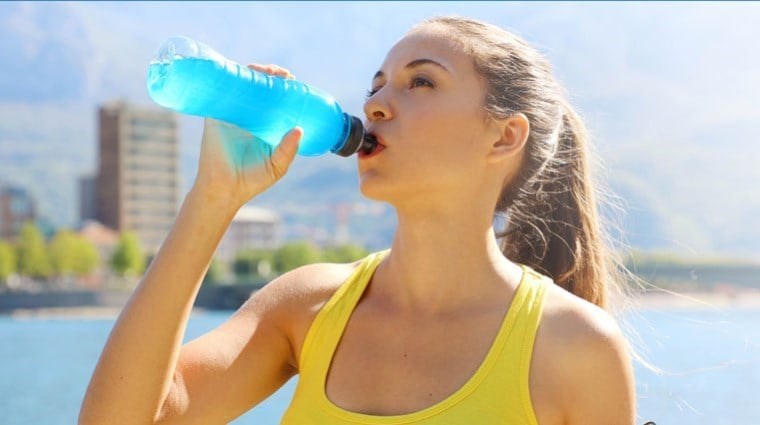
Finally, we have hydration. Hydration plays a vital role in your overall health and wellbeing, especially when it comes to athletic performance.
When you’re physically active, your body temperature rises, and your body’s thermoregulation relies on water for cooling down the body and regulating temperature. Consequently, when you’re well hydrated, your heart doesn’t have to work as hard, and your muscles are more efficient.
Dehydration, on the other hand, can impair your performance and cognitive functions. It’s simple: stay hydrated to keep your body well-regulated.
But when do electrolytes come into the picture?
Electrolytes facilitate the transport of nutrients into cells and waste products out of cells. Adequate levels of electrolytes can help prevent muscle cramps during physical activity, as cramps are typically a sign of electrolyte imbalance. Electrolytes also help regulate the balance of fluids in and out of cells, tissues and organs.
Some essential electrolytes include sodium, potassium, calcium and magnesium. These nutrients can be found naturally in foods like bananas, potatoes, tomatoes and almonds.
In summary, proper nutrition provides the body with the necessary vitamins, minerals and macronutrients needed for energy and muscle repair. Similarly, proper hydration and electrolyte intake ensure adequate thermoregulation, among many other benefits.
Together, a healthy diet and proper hydration balance each other to keep you healthy and energised when you train.
💡KEY TAKEAWAY: Hydration and electrolytes are a dynamic duo in running performance. Incorporating them into your diet along with healthy foods can significantly enhance your running experience and overall wellbeing.
Check out our Ultramarathon Nutrition & Hydration Guide for more information.
At Sportitude, we elevate your running to new heights. By combining cutting-edge gear with expert insights, we’re not just outfitting you for success; we’re helping you achieve it.
